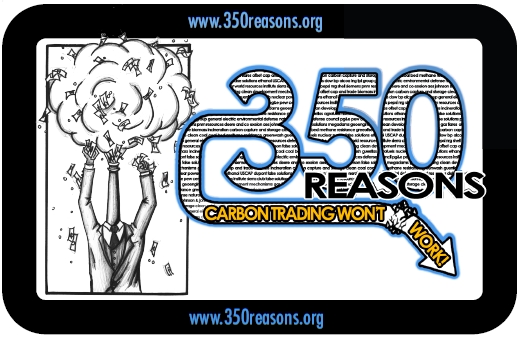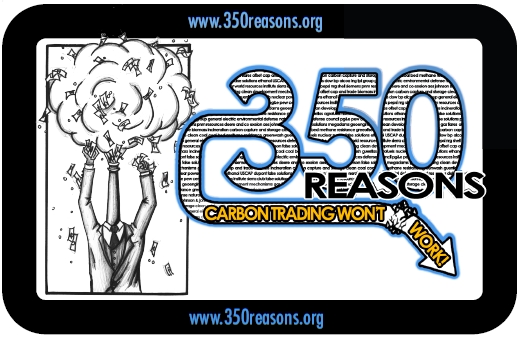 Courtesy 350reasons.org350.org is taking a big-tent approach to activism on its International Day of Climate Action this Saturday, inviting anyone who wants to help to join a climate-change demonstration, or create one of their own.
Courtesy 350reasons.org350.org is taking a big-tent approach to activism on its International Day of Climate Action this Saturday, inviting anyone who wants to help to join a climate-change demonstration, or create one of their own.
That open invitation means not everyone will be pushing the same message. In fact, a trio of groups will use the day, and the number 350, to highlight their opposition to market-based approaches to capping global warming emissions. In other words, to oppose cap-and-trade, the mechanism integral to the clean energy bill in Congress and to the United Nations approach.
Those groups—Rising Tide North America, Carbon Trade Watch, and the Camp for Climate Action—recently launched 350reasons.org, a collection of reasons why they oppose emissions trading. At climate-day events on Saturday they’ll be handing out pamphlets (sorry, “zines”), detailing some of those reasons. They’ve also promised a “video report,” to be released soon. They’ve essentially taken a no-compromise approach to climate action, preferring to defeat a flawed plan rather than see it succeed and hope it can be fixed later on.
“We’re trying to say there’s no way to reach 350 parts per million through carbon trading,” said Rising Tide’s Brihannala Morgan, a U.C. Berkeley graduate student. “It’s a false solution.”
Among the 350 reasons:
- “Carbon Trading means more coal.” The site notes that the Waxman-Markey energy bill passed by the House included not just cap-and-trade but provisions to allow 43 new coal plants.
- “It perpetuates the dominance of rich countries over poor.”
- “Carbon trading is based on an ideological belief in the omnipotence of the market.
- Carbon markets are fundamentally undemocratic.” Climatologist James Hansen opposes cap-and-trade. He says the proposed UN plan is “guaranteed to fail.”
Actually, the group has 450 reasons at the moment, Morgan said; it’s working to edit them down.
350.org founder Bill McKibben says the point of Saturday’s events was never to choose specific policies, but to build a broad movement demanding that leaders reverse the rising atmospheric concentration of greenhouse gases. For too long, he said, the climate problem has been a debate between experts—scientists, economists, and policy wonks.
“There’s been no movement to back them up, no counter-pressure big enough to stand up to the unrelenting pressure from vested interest,” he said last week. “We’re helping provide the popular part of that movement.”
While 350.org doesn’t take positions on specific policy strategies such as cap-and-trade, it shares the sense of urgency of the no-cap-and-trade groups. For that matter, most people working to push a climate bill through Congress share the same sense of urgency. Most readily admit that any bill that can pass through Congress will be too weak to stop climate change. But they would prefer to get started rather than to insist on a perfect bill.
“We have to start some place and we have to start now,” Daniel J. Weiss, director for climate strategy at the Center for American Progress, said in response to a Rising Tide campaign last month.
350.org organizers say they’re OK with off-message groups joining Saturday’s events.
“We encouraged lots of different groups to join,” said May Boeve, a 350.org partnerships director. “We’ve cast a very large net.”
Those groups will include churches, performance artists, and extreme athletes. They will include Chinese businessmen holding a black-tie gala in Shanghai, an odd partner for the 350reasons.org groups critical of corporate influence.
When I asked McKibben about how to engage the ‘no-compromise’ types last week, he said it was too soon to fight over plans. No legislation would be sufficient until the public was making more noise on the climate emergency.
“It’s too early to make calls on what happens with the legislation, because we haven’t built a movement to push that process as hard as it needs to be pushed,” he said. “Politicians aren’t feeling pressure either in Washington or in Copenhagen to do more than the minimum. We need to provide that pressure.
“Another way to say that is, we need to give people who want to do the right thing some room to do it. Barack Obama has not laid his cards on the table yet. We need to give him some maneuvering room, to show him that people have his back, not just here but all over the world.”
The question, then, seems to be whether 350reasons.org and the like will amplify the pressure on political leaders, or fracture it.



